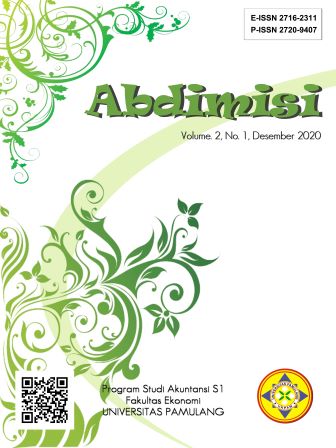Enterpreneurship Training: Encouraging MSME Growth in the Startup Ecosystem
DOI:
https://doi.org/10.32493/abms.v5i2.44551Abstract
The startup ecosystem starts from parties that encourage MSMEs in entrepreneurship training. because entrepreneurship training can help MSMEs develop business networks, motivate MSMEs and gain wider access to business assistance. Pamulang Estate is one of the MSME communities in South Tangerang, specifically in Pamulang Timur Village. Pamulang Estate UMKM is a community of several businesses owned by residents who live in the Pamulang Estate Complex. UMKM Pamulang Estate has 68 business actors who are its members. Some of them are food and beverage businesses and handicrafts. Pamulang Estate UMKM members are dominated by housewives whose business is limited to trading and who have not yet focused on developing their business. This PKM aims to provide (1) Pamulang Estate MSMEs with an understanding of the concept of entrepreneurship training. (2) Pamulang Estate MSMEs gain a wider business network in the startup ecosystem environment. (3) Pamulang Estate MSMEs understand the importance of business incubators. Participants understand the importance of promotion and joint marketing. As a result of this PKM, Pamulang Estate MSMEs can understand the importance of entrepreneurship training and participating in business incubators to develop their business.
Abstrak
Ekosistem start-up dimulai dari pihak-pihak yang mendorong UMKM dalam pelatihan kewirausahaan. Karena pelatihan kewirausahaan dapat membantu UMKM mengembangkan jaringan bisnis, memotivasi UMKM, dan mendapatkan akses yang lebih luas terhadap bantuan bisnis. Pamulang Estate adalah salah satu komunitas UMKM di Tangerang Selatan, khususnya di Desa Pamulang Timur. UMKM Pamulang Estate adalah komunitas dari beberapa usaha yang dimiliki oleh warga yang tinggal di Kompleks Pamulang Estate. UMKM Pamulang Estate memiliki 68 pelaku usaha yang menjadi anggotanya. Beberapa di antaranya adalah usaha makanan dan minuman serta kerajinan tangan. Anggota UMKM Pamulang Estate didominasi oleh ibu rumah tangga yang usaha mereka terbatas pada perdagangan dan belum fokus pada pengembangan usaha. Tujuan dari PKM ini adalah untuk memberikan (1) pemahaman kepada UMKM Pamulang Estate tentang konsep pelatihan kewirausahaan. (2) UMKM Pamulang Estate mendapatkan jaringan bisnis yang lebih luas dalam lingkungan ekosistem start-up. (3) UMKM Pamulang Estate memahami pentingnya inkubator bisnis. Peserta memahami pentingnya promosi dan pemasaran bersama. Sebagai hasil dari PKM ini, UMKM Pamulang Estate dapat memahami pentingnya pelatihan kewirausahaan dan pentingnya berpartisipasi dalam inkubator bisnis untuk mengembangkan usaha mereka.
Kata kunci: UMKM Pamulang Estate, Pelatihan Kewirausahaan, Ekosistem Start-Up.
References
Azzahra, B., & Wibawa, I. G. A. R. P. (2021). Strategi optimalisasi standar kinerja UMKM sebagai katalis perekonomian indonesia dalam menghadapi middle income trap 2045. Inspire Journal: Economics and Development Analysis, 1(1), 75-86.
Agustina, T. S. (2011). Peran inkubator bisnis perguruan tinggi dalam meminimalkan resiko kegagalan bagi wirausaha baru pada tahap awal (start-up). Majalah Ekonomi, 1, 64-74.
LAKIP (Laporan Akuntabilitas Kinerja Instansi Pemerintah). (2020). Dinas Koperasi Usaha Kecil dan Menengah Kota Tangerang Selatan.
Munkongsujarit, S. (2016). Business incubation model for startup company and SME in developing economy: A case of Thailand. In 2016 Portland International Conference on Management of Engineering and Technology (PICMET) (pp. 74-81). IEEE.
Mongid, A., & Notodihardjo, F. S. (2011). Pengembangan daya saing UMKM Di malaysia dan singapura: sebuah komparasi. Jurnal Keuangan dan perbankan, 15(2).
Pirson, M., Martin, K., & Parmar, B. (2019). Public trust in business and its determinants. Business & Society, 58(1), 132-166.
Purnomo, B. R. (2017). Efektivitas Pelatihan Kewirausahaan Dalam Meningkatkan Pengetahuan Dan Motivasi Berwirausaha Pada Penyandang Tunarungu. Ekspektra: Jurnal Bisnis dan Manajemen, 1(1), 21-30.
Salim, M. N., Marlapa, E., Ismail, S., Abd Rahman, N. H., Hussin, H., Susilastuti, D., & Murti, W. (2022). Determinants of MSMEs growth and its impact on income and unemployment: Cases of Indonesia and Malaysia. International Journal of Academic Research in Economics and Management Sciences, 11(1).
Downloads
Published
Issue
Section
License
Copyright (c) 2024 Ratih Qadarti Anjilni, Roshaiza Taha, Asep Kurniawan, Susinah Kuntadi, Yan Noviar, Widia Febriana, Rachmad Chartady, Ickhsanto Wahyudi, Eka Rima Prasetya, Listiya Ike Purnomo

This work is licensed under a Creative Commons Attribution-ShareAlike 4.0 International License.
Copyright Notice
Authors who publish with this journal agree to the following terms:
- Authors retain copyright and grant the journal right of first publication with the work simultaneously licensed under a Creative Commons Attribution License that allows others to share the work with an acknowledgement of the work's authorship and initial publication in this journal.
- Authors are able to enter into separate, additional contractual arrangements for the non-exclusive distribution of the journal's published version of the work (e.g., post it to an institutional repository or publish it in a book), with an acknowledgement of its initial publication in this journal.
- Authors are permitted and encouraged to post their work online (e.g., in institutional repositories or on their website) prior to and during the submission process, as it can lead to productive exchanges, as well as earlier and greater citation of published work (See The Effect of Open Access).
Abdimisi have CC-BY-SA or an equivalent license as the optimal license for the publication, distribution, use, and reuse of scholarly work.
In developing strategy and setting priorities, Abdimisi recognize that free access is better than priced access, libre access is better than free access, and libre under CC-BY-SA or the equivalent is better than libre under more restrictive open licenses. We should achieve what we can when we can. We should not delay achieving free in order to achieve libre, and we should not stop with free when we can achieve libre.
You are free to:
- Share — copy and redistribute the material in any medium or format
- Adapt — remix, transform, and build upon the material for any purpose, even commercially.
- The licensor cannot revoke these freedoms as long as you follow the license terms.

